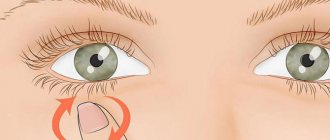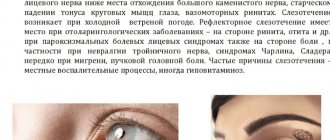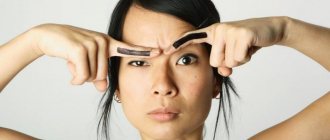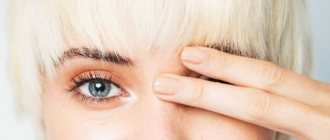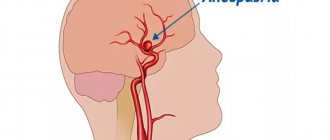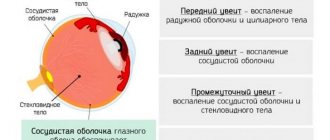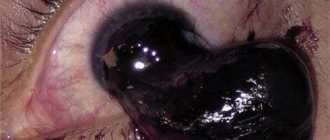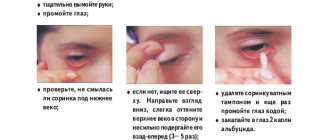A nervous tic is a type of disease characterized by contraction of a specific muscle group. This pathological condition occurs most often in the facial area and represents various combinations of mechanical movements. This disease is mainly characteristic of children, but can also occur in adulthood.
The most common nervous tic is a nervous tic of the eye (eye twitching). There are two main types:
- primary;
- secondary.
In the first case, the disease develops due to autonomic disorders of the nervous system; in the second case, it occurs due to changes in the functioning of the brain.
Causes of nervous tics
A nervous tic, or blepharospasm, is the name given to frequent and rapid twitching of small muscles responsible for facial expressions around the eye. Sometimes a tic can develop for no apparent reason and appear from time to time over many years. Occasionally it occurs against the background of stressful events and after them goes away without a trace.
Among the main reasons for the development of blepharospasm are:
- nervous shocks;
- lack of calcium and magnesium in the body;
- taking medications - psychostimulants, antidepressants and antipsychotics;
- overfatigue - a nervous tic can be provoked by ordinary fatigue of the facial muscles;
- worms - this cause is more common in children.
Attention! In some cases, blepharospasm can signal really serious diseases that have not yet manifested themselves in full force. This symptom can occur with vegetative-vascular dystonia and multiple sclerosis, brain tumors and the latent course of Tourette’s disease.
Symptoms of a nervous tic
Almost the only symptom of a tic is the twitching of the muscles around the eyes. There is no way to control the tic - the muscle tissue contracts involuntarily, the twitching occurs completely unexpectedly and goes away just as abruptly.
Blepharospasm is not always noticeable to others. In some cases, eye twitching is actually visible from the outside. But sometimes only the person himself feels discomfort from a nervous tic of the eye, while visually his facial expressions do not change.
Causes
A nervous tic of the eye does not pose a serious threat to human life and health, but is a signal that a malfunction is occurring in the body. Possible factors causing this process include:
- Contact of a foreign object with the mucous membrane of the eye.
- Excessive dry eyes.
- Reaction to light.
- Irritation of the cornea.
- Poor nutrition. An imbalance of certain microelements (glycine, calcium, magnesium) can cause spasms and various types of seizures.
- Incorrect combination of physical activity and rest, insufficient time for sleep.
- A consequence of taking certain types of medications.
- Heredity, genetic predisposition.
- Common fatigue associated with insufficient lighting, prolonged time spent at a computer monitor or watching TV.
- The most commonly known cause of nervous eye tics is stress, mental and emotional disorders. These factors do not cause an immediate reaction, but over time they can cause reactive symptoms.
- Redness of the eyes.
The above reasons do not always serve as a reason for involuntary muscle contraction. Sometimes this illness directly depends on the following previously suffered diseases:
- Injury to the facial nerve.
- Inflammatory processes of the membrane of the eye (conjunctivitis).
- ORZ.
- ARVI.
- Parkinson's disease.
- Bell's palsy.
- Infection with worms and other parasites.
- Inflammation of the eyelid.
- Birth injuries.
- Brain oncology.
- Vegetovascular dystonia.
A nervous tic of the eye affects mainly the psychological state of a person, but sometimes slight discomfort is felt if muscle tension increases.
Which doctor should I go to?
If a nervous tic occurs repeatedly and frequently, it is recommended to make an appointment with a doctor to determine the cause of the twitching. First of all, you should go to an appointment with a therapist, and take children to a pediatrician.
Since the causes of blepharospasm can be very different, first you need to undergo a primary diagnosis and at least approximately determine what causes the nervous tic of the eye. Depending on the results of the examination, the general practitioner will be able to refer the patient to a highly specialized specialist - a neurologist, psychotherapist, oncologist or even a narcologist.
Why does the eye twitch
Ophthalmologists often associate nervous tics of the eye with the intense rhythm of human life. If he is constantly busy at work, does not get enough sleep, and eats poorly, then this becomes the cause of not only a nervous tic, but also many other, more dangerous problems.
Stress, frustration and depression are also common causes of nervous tics. The human nervous system is constantly in a tense state. The brain doesn't rest. The excitability of the nervous system often provokes intense contraction of the eye muscles. But it doesn’t matter which eye starts to twitch - the right or left. Muscle contractions can occur under the lower eyelid or above the upper.
A nervous tic rarely indicates the development of serious illnesses, but in some situations, a condition where the eye twitches is the cause of a developing pathology. Most often, intense muscle contraction is associated with the development of diseases in which the patient is forced to blink frequently. Such ophthalmological problems can be conjunctivitis or blepharitis. During the period of exacerbation of an ophthalmological disease, the patient begins to actively manifest pathological symptoms, one of which can be called a nervous tic of the eye.
Certain physiological features of the eye structure can also cause twitching of the lower or upper eyelid. A similar situation occurs with dry eye syndrome. The process is characterized by a decrease in the production of tear fluid, as a result of which the cornea of the eye is poorly moisturized. Dryness of the membrane leads to itching or nervous tic of the eye.
Another pathological cause of intense contraction of the eye muscles is an allergic reaction. In this case, a nervous tic will certainly be accompanied by other symptoms - swelling of the eyes, lacrimation, sneezing, etc.
Diagnostics
The study of the sources of nervous tics begins with an initial examination. At the initial stage, you will need to take several tests and, if necessary, undergo hardware diagnostics.
Necessary tests
When studying the causes of nervous tics, the doctor usually prescribes directions for the following tests:
- laboratory tests of urine and blood, these tests allow you to determine whether there is an infection in the body, traces of potent drugs, signs of severe organic lesions;
- stool analysis - referrals are usually given to children, since it is they who have ticks that often indicate the appearance of worms;
- a blood test showing the level of thyroid hormones - blepharospasm can be caused by endocrine disorders;
- ionogram, this analysis allows you to assess the level of calcium and magnesium, which are responsible for the functioning of muscles, in the patient’s body.
As a rule, a urine test and a general blood test are prescribed without fail, and the doctor sends you for other tests as needed.
Instrumental examination
If the causes of the tic cannot be determined using tests, the doctor may prescribe additional hardware testing. Sources of blepharospasm are studied using:
- EEG - electroencephalogram, which allows you to study the activity of different parts of the brain;
- EMG - myography, which is used to diagnose the activity of various muscle groups at rest and at work;
- MRI - magnetic resonance imaging, which allows you to check the presence or absence of tumors and other pathologies of the brain;
- CT - computed tomography, also aimed at searching for tumors or injuries of the skull and neck bones.
If a nervous tic of the eye is caused by serious organic lesions, then hardware diagnostics allows you to quickly and accurately determine the causes. But in practice, blepharospasm rarely indicates pathologies. More often it occurs due to stress and tension.
Folk remedies
In the absence of other symptoms, a nervous tic, as a rule, does not require special treatment. Most often, simple folk remedies are enough to save a child from the disorder:
- Pour boiled water over a mixture of anise seeds, rue and plantain in a ratio of 1:1:3. Add a little honey and chopped lemon. Place the resulting mass in a water bath for 10 minutes. Strain and let cool. The child should consume the resulting infusion 1-4 tbsp. l. three times a day.
- Prepare a herbal mixture of chamomile (3 parts), mint (2 parts) and valerian root (1 part). Take 1 tbsp. l. mixture and pour a glass of boiling water over it. The child should drink a glass of infusion before breakfast and at night.
- Place fabric pillows filled with dried lavender or chamomile flowers next to the sleeping child. Thanks to their unobtrusive sedative effect, the pads can also be used to prevent nervous tics.
- Give your child a light massage before bed. This will help him relax and feel more comfortable in his own body.
- Draw a bath with sea salt for your child. This relaxation is especially useful before bed.
If the children's daily routine and proper nutrition are followed, and the nervous tic does not go away for a long time, you should definitely consult a neurologist. Sometimes it makes sense to consult a psychiatrist or have your brain examined.
First aid for nervous tics
Blepharospasm has little effect on the quality of life, but it interferes with everyday activities. If the eye twitches due to a nervous tic, it becomes difficult for a person to concentrate on business and conversations. When a nervous tic appears, you want to remove it as soon as possible.
As first aid for blepharospasm, doctors recommend:
- close your eyes and take a relaxed position, trying to relieve tension from the facial muscles and neck;
- open your eyes wide, blink quickly and sharply several times, and then close your eyes again for a minute and relax;
- Press your finger firmly on the point in the middle of the eyebrow for a few seconds;
- Press the corners of your eyes firmly with your fingers for a couple of seconds.
If possible, you should stop reading or working at the computer for the next half hour or hour and give your eyes a rest. It will be useful to go for a walk down the street, your eyes will be able to relax faster and the tic will recede.
Prevention
As everyone knows, it is easier to prevent a disease than to treat it. This case is also no exception. Let's consider those recommendations that are preventive methods for nervous tics.
Be sure to establish proper balanced nutrition. To do this, you need to exclude spicy foods, coffee, and strong tea. At the very least, the consumption of such drinks should be reduced to a minimum.
When working at a computer, you need to take a short break every hour. During this time, try to do eye exercises. To be honest, any exercise in this case will not harm, but will only be beneficial. It is better to purchase a monitor with a protective screen.
Eye exercises should be done every day. Decide with your doctor how much time to devote to this. When there is a lot of strain on the eyes, you need to look more often at foreign objects. This will relieve tension. Avoid overwork.
Sleep should be complete and of high quality. An adult should sleep 7-8 hours. This is the least. To maintain health, special attention must be paid to this rule.
All prevention is aimed at minimizing stressful situations. Stress is your enemy. Control your condition and avoid such situations.
Wear sunglasses in summer.
You need to walk outside every day. Walk, run or bike - it's your choice. Playing sports has always improved your health. But there should be a walk in the fresh air.
Peppermint tea before bed is an excellent sedative. This drink will help you fall asleep. Plus it is very tasty.
Take vitamin complexes twice a year. These complexes must include B vitamins, magnesium, and calcium.
Expert opinion
Danilova Elena Fedorovna
Ophthalmologist of the highest qualification category, Doctor of Medical Sciences. Has extensive experience in diagnosing and treating eye diseases in adults and children.
There is no need to delay or put off seeing a doctor. This can lead to serious complications. Due to untimely treatment, various nervous tics may appear, as a constant contraction of certain muscle groups may occur. This is painful for the patient. And this state of affairs will continue for a long time. If such a situation arises with a child, then it will be very difficult for him to adapt to society.
How to remove a nervous tic from the eye
Blepharospasm can be eliminated using simple actions; usually an attack of a nervous tic passes quite quickly. But if blepharospasm recurs frequently, then there is a need to solve the problem comprehensively - with the help of medications and exercises.
Use of medications
If a nervous tic is caused by disturbances in the functioning of the muscular and nervous systems, then based on the results of the examination, the doctor may prescribe appropriate medications. Usually, for repeated blepharospasm, several vitamins are used for nervous eye tics.
Calcium gluconate
The drug improves the passage of nerve impulses and helps control the contraction and relaxation of facial muscles. The medicine is approved, including for children's use.
Glycine
The drug improves the functioning of the nervous and metabolic systems, relieves stress and improves brain activity. Glycine is often recommended for use during stress and intense mental stress.
Afobazole
If a nervous tic is caused by psycho-emotional stress, then a natural and harmless sedative will help relieve unpleasant symptoms of stress. With a good effect, the drug has a minimum of contraindications and is sold without a prescription.
Phenazepam
This drug is a fairly serious drug. It is used for frequent and severe nervous tics - Phenazepam calms well, relieves muscle cramps and generally effectively relaxes muscle tissue.
Advice! Many drugs for relieving blepharospasm are sold by pharmacies freely and without a prescription. But before using medications, in any case, it is better to consult a doctor.
Folk remedies
In addition to medications, to eliminate nervous tics, you can resort to traditional medicine recipes. All of them are completely harmless if the indicated dosages are observed and have a general beneficial effect on the body.
Chamomile decoction
Pharmaceutical chamomile has pronounced calming and relaxing properties. Brew a bag of chamomile tea from a pharmacy in a glass of boiling water, let it cool slightly and add a spoonful of honey. Drink the decoction twice a day - in the morning and evening on an empty stomach.
Medicinal herbs for nervous tics
Method 1. Chamomile decoction has an excellent effect. To prepare it, take 4 tbsp. spoons of inflorescences, brew in 250 ml of boiling water. Then you need to boil, keep on fire for at least fifteen minutes, and strain. Drink 1/3 tbsp. three times a day, preferably on an empty stomach.
Method 2. Against nervous tics, use a hawthorn-based tincture. First you need to crush the fruits, namely 1 tbsp. l., pour 350 ml of boiling water. Take on an empty stomach at least three times.
Method 3. You can prepare a special compress based on geranium leaves. The raw material is crushed and then applied to the affected area. Cover with a cloth for fifteen minutes. The frequency of manipulations per day is about three to five times.
Method 4. A herbal mixture consisting of heather leaves, chicory and thyme, valerian root, and dried cucumber will help.
All components are taken in equal proportions; as for chicory, you will need half as much of it. Next 1 tbsp. l. collection, pour 270 ml of boiling water and strain. The dosage is one hundred and fifty milliliters per day. Before starting treatment, it is advisable to consult a doctor. Each case is individual, so you will need the exact dosage and duration of therapy.
Prevention of nervous tics
To prevent a nervous tic from appearing again after treatment, it is important to reconsider your lifestyle and pay increased attention to your daily routine and nutrition. Under conditions of constant physical and emotional stress, blepharospasm will return, so it is necessary to combat it, including preventively.
Proper nutrition
The health of the nervous and muscular systems largely depends on human nutrition. To prevent disruptions in the body, it is recommended to eat at least 5 times a day at the same time in small portions.
The diet should contain enough protein, carbohydrates and fats - the lack of one of the components will negatively affect your health. The ideal BZHU ratio looks like 30%, 20% and 50%, respectively - with this diet the body will receive all the necessary substances. There should be a sufficient amount of vegetables and fruits on the daily table; it is better to reduce sugar in the diet.
Important! If you are prone to nervous tics, you should eat fermented milk products, greens, legumes and nuts more often. They contain large amounts of calcium and magnesium.
Relaxation
The ability to relax plays an important role in the prevention of nervous tics. It is recommended to find time each day for quiet relaxation, such as walking in the fresh air or doing yoga, swimming or massage. It is useful to communicate with pets or engage in creativity, it is also calming and relaxing.
Essential oils
Aromatherapy has a good effect on the nervous system. If you are prone to nervous tics, it is recommended to use an aroma lamp more often and fill the room with the scents of orange, lavender, juniper or mint. A pleasant aroma helps to avoid unnecessary stress, promotes normal sleep and maintains a good mood.
Healthy sleep
The most important condition for the normal functioning of the nervous system is healthy sleep. Night rest should take at least 7-8 hours, and it is advisable to go to bed at the same time. It is better not to use a computer or smartphone before going to bed. They make it difficult to relax and tune in to rest, because they stimulate the brain to work actively.
What to do if your eye twitches, how to treat it
Since it is possible to stop a nervous eye tic if the influence of the provoking factor is eliminated, treatment of blepharospasm in adults and children is carried out using various methods. Due to the fact that this problem often occurs due to a disorder of the nervous system (fatigue, fear, stress), therapy is mainly carried out using medications.
In some cases, if the eye twitches, correcting nutrition or taking traditional medicine can help restore the patient’s condition. Special exercises also help to cope with this phenomenon.
Drug treatment
In cases where the eyelid of the left or right eye twitches involuntarily, treatment is carried out using sedatives. Moreover, herbal-based medicines containing motherwort or valerian are more often selected.
For intense blepharospasm, it is recommended to take and drink antispasmodics:
- "Phenazepam";
- "Baclofen";
- "Phenibut";
- "Clonazepam."
Tablets of this type for nervous eye tics are allowed to be taken only after a doctor’s prescription. Uncontrolled use of antispasmodics can worsen the patient's condition.
For nervous tics, medications containing calcium and magnesium are indicated. These substances normalize the transmission of impulses along the affected fibers, thereby improving the activity of the eyelid muscles.
Children are not usually treated with medications. Patients in this group are recommended to spend more time in the fresh air. Parents need to provide their children with a calm environment within the family.
In extreme cases, when drug treatment does not have an effect, Botox injections are performed into the affected area. This method gives short-term results.
Treatment at home
If the patient knows exactly what causes blepharospasm and has identified the cause of involuntary twitching of the eyelid, treatment with folk remedies is allowed. The basis of therapy is methods that help calm the nervous system.
There are several solutions to the problem of how to quickly get rid of nervous eye tics at home. For blepharospasm, it is recommended to apply compresses to the problem area:
- with ice (cold water);
- with bay leaf;
- with tea;
- with decoctions of chamomile and other plants that have an anti-inflammatory effect;
- with melted honey.
Taking baths with sea salt or essential oils can help cure nervous eye tics. This procedure has a calming effect on the nervous system.
At the same time, you should include greens, strawberries, nuts, cocoa, raisins, bran bread, pork, and rabbit meat in your diet. Nutrition correction provides a similar effect.
Exercises for nervous tics
If your eye twitches frequently, the following exercises can help:
- It is necessary to squeeze the eyelid as hard as possible, and then sharply open the eye. The exercise should be repeated until tears appear.
- Massage the lower eyelid.
- Blink a few times, and then close your eyelids halfway, waiting until the trembling disappears.
Exercises give a temporary effect. To eliminate blepharospasm, it is necessary to get rid of the influence of the factor that caused the malaise.
How to treat nervous tics in children?
When a child has a nervous eye tic, the causes are determined mainly by the psycho-emotional state. To cope with this disorder, it is necessary to change the attitude towards children. In particular, if a child’s nerve twitches under the eye on one side or the other, you should not focus on this so as not to aggravate the situation.
In the treatment of blepharospasm in children, it is recommended to use soothing teas with lemon balm or tinctures of motherwort and valerian. Despite the fact that the child’s psyche is unstable, he can cope with the problem on his own. To do this, it is enough to increase physical activity by enrolling him in a sports section.
If the recommendations given do not help eliminate the child’s nervous tic, and involuntary blinking of the eyes continues to bother you, you should consult a psychologist.
Possible complications of tics
In general, nervous tics are not a dangerous disease. However, if left untreated, it can lead to unpleasant consequences, namely:
- to chronic irritation and redness of the eyes, purulent inflammation;
- to drooping of the upper eyelid and spasms of other facial muscles;
- to the occurrence of migraines and double vision;
- to nervous disorders - with a constant nervous tic, a person feels tension and discomfort, this affects the general physical and psychological state.
It is important to remember that blepharospasm may indicate serious disorders such as Tourette's syndrome or Parkinson's disease.
Treatment of nervous tics with traditional methods
Folk remedies always protect health. The optimal solution is teas (decoctions) from medicinal herbs and their collections. Here are some of the simplest, most effective, safest recipes.
- Mint tea. Mint contains a lot of minerals and vitamins, essential oils. Has a beneficial effect on the nervous system. Recommended for eyelid trimming.
- Melissa tea. It has similar properties, differs in aroma and taste.
- Valerian decoction. It has a more pronounced sedative effect on the central nervous system. Copes with severe stress. It is recommended as both a primary and an auxiliary remedy for involuntary muscle contractions.
- Collection of herbs from mint or lemon balm, valerian root, hop cones. Equal proportions. A good general strengthening agent, has a positive effect on the activity of the central nervous system.
- Herbal collection St. John's wort, lemon balm, lavender. Equal proportions. It copes well with nervous disorders.
Brew like regular tea and let steep. Drink half a glass twice a day.
It is important to remember that all folk recipes can be used as additional means to traditional medical therapy, but not instead of it.

